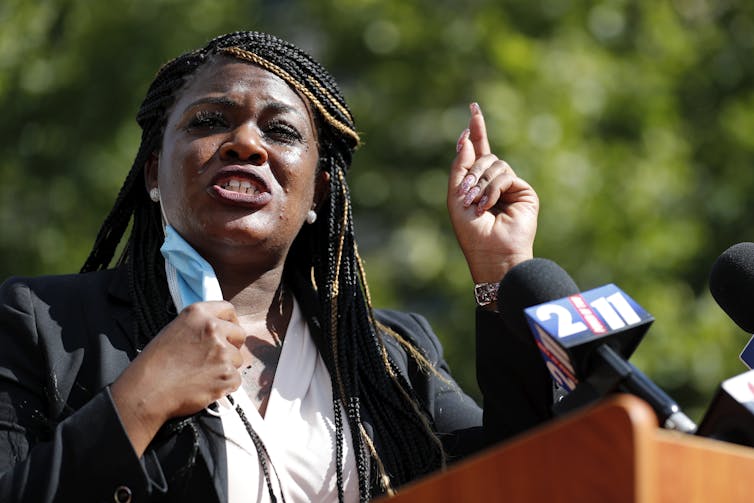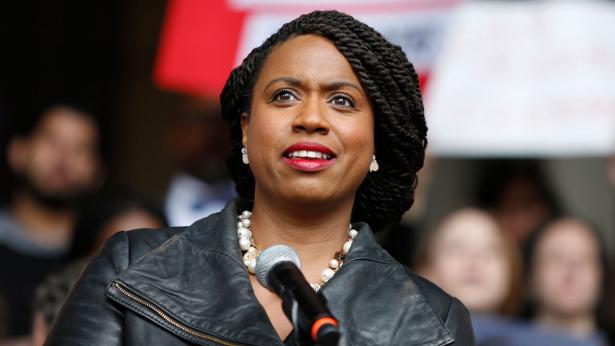More Women and More Black Women than Ever Ran for Congress in 2020, But They Still Lost Ground
In 2020, Black women set a new record – 117 entered primaries for the House and 13 for the U.S. Senate, according to the Center for American Women and Politics.
In total, 643 women were candidates in congressional primary and general elections, including a record number of Asian or Pacific Islander, Latina, Middle Eastern or North African and Native American women.
Still, women ended up losing eight seats in Congress. In 2018, the nation elected 127 women – and 48 women of color – to the House and Senate. This year, that dropped to 117 women and 45 women of color.
Throughout my career as a political science professor, I’ve studied women’s representation in mayoral, congressional, gubernatorial and presidential elections.
Here’s my look at the female demographics of Congress following the 2020 elections.
Freshmen no more
Many of the women first elected to Congress in 2018 retained their seats.
All four members of “the Squad” were reelected. These women – Ayanna Pressley, Ilhan Omar, Alexandria Ocasio-Cortez and Rashida Tlaib – are Democratic women of color known for their progressive policies, including the Green New Deal.
Also reelected were Illinois Democrat Lauren Underwood, winner of a predominantly white and Republican district in 2018; Jahana Hayes, the first Black woman to represent Connecticut; and Georgia’s Lucy McBath, winner in a district that had been held by Republicans for almost four decades.
These reelections prove that their victories in 2018’s “pink wave” weren’t a fluke and that they have real staying power in Congress.
In some of the 2020 congressional races, Black women ran against each other – a sign of their strong participation. For example, Florida’s Val Demings, Florida’s Frederica Wilson and Georgia’s Nikema Williams – who will succeed the late civil rights icon John Lewis – won their congressional races after defeating other Black females.

Activist Cori Bush will represent Missouri in the 117th Congress. AP Photo/Jeff Roberson, File
Notable newcomers
Some women will be joining Congress for the first time in January.
Cori Bush, a Black Lives Matter activist, became Missouri’s first Black female congresswoman and represents a district that includes the cities of St. Louis and Ferguson, the site of the police killing of African American teenager Michael Brown in 2014. Ferguson also elected its first Black female mayor this year.
Bush defeated African American Congressman William Lacy Clay Jr.. Clay, Jr. and his father represented the district for over 50 years.
Other women of color joining Congress for the first time include Telemundo journalist Maria Elvira Salazar, a Republican who unseated Donna Shalala in Florida, and attorney Teresa Fernandez, a Democrat from New Mexico.
Some underdogs didn’t make it
So who lost?
Arkansas’s Joyce Elliott, a teacher and veteran state legislator, came up short in her bid to become the first African American congressional member from Arkansas.
Florida’s Pam Keith, a military veteran and attorney, lost by a wide margin to her Republican opponent.
Patricia Timmons-Goodson, the first African American member of the North Carolina Supreme Court whose federal judicial nomination by Barack Obama was blocked by Republicans, failed to win a seat in Congress.
Also coming up short was Tennessee’s Marquita Bradshaw, a single mother and environmental activist who would have been Tennessee’s first Black female congressional member if she had won.
California’s Tamika Hamilton, Georgia’s Vivian Childs, Maryland’s Kimberly Klacik and Ohio’s Lavern Gore are all Republicans who ran in mostly urban Democratic districts, but none won on election night. All Black female congresswomen – with the exception of Utah’s Mia Love, who served one term in the House – have been Democrats, suggesting that the path to victory is especially steep for Black Republican women.
A white man’s government?
The caption of this 1868 cartoon read, ‘This is a white man’s government. We regard the Reconstruction Acts (so called) of Congress as usurpations, and unconstitutional, revolutionary, and void - Democratic Platform.’ World Cat
For most of its history, the members of both Houses of Congress have been white men.
The monotony began to break in 1917 when Montana’s Jeannette Rankin became the first female congresswoman. In 1964, Hawaii’s Patsy Mink became the first Asian American congresswoman. The first Latina, Ileana Ros-Lehtinen of Florida, was elected in 1989.
In 1968, the late Shirley Chisholm became the first Black woman to serve in Congress. Four years later, two more Black women arrived in Congress, Barbara Jordan of Texas and Yvonne Braithwaite-Burke of California.
Chisholm called Black women “catalysts for change” in politics. U.S. Rep Maxine Waters, a Democrat from California, once tweeted, “I cannot be intimidated and I’m not going anywhere.”
Kimberlé Crenshaw’s theory of intersectionality suggests Black women are disadvantaged because of the “intersection” of their racial, gender and class identities. One result is that they encounter disadvantages when running for office.
Some of these women were disadvantaged by their race, gender or class when running against well-funded incumbents. Yet, my work in the field of women and politics also suggests that the long tradition of Black female political leadership in America is gaining momentum.
Sharon Austin is a Professor of Political Science, University of Florida



Spread the word